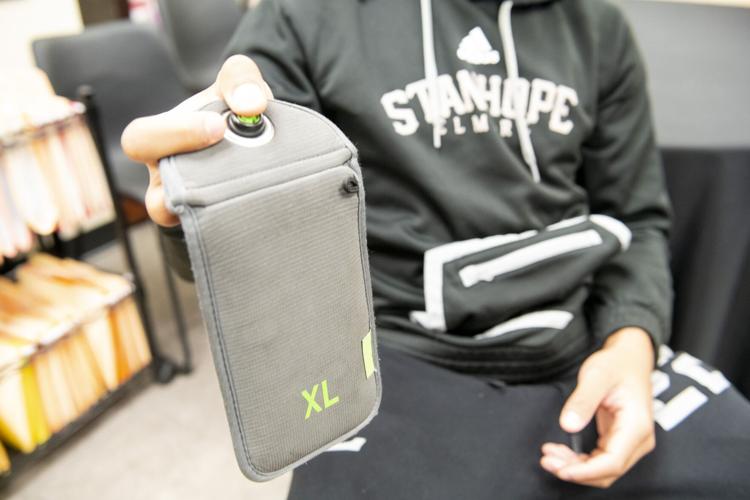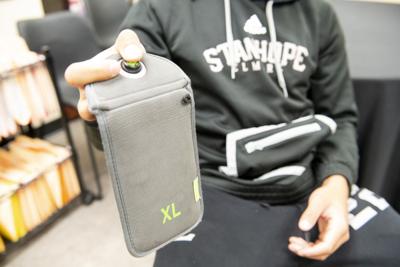School has returned to normal after banning cellphones at Stanhope Elmore High School.
Students haven’t had access to cell phones during the school day for almost two full school years. The distractions that provide some silence have been exchanged for higher test scores, less discipline issues and more socialization.

Cliff Williams / TPI Stanhope Elmore High School is being recognized for its cell phone pouch program. The school is a CLAS School of Distinction and could become a Banner School.
Principal Ewell Fuller had a problem with distracted students two years ago and he wasn’t alone.
“There is no doubt about it, cell phones are a cancer in schools,” Fuller said. “Teachers came to me and said we can either teach or we can monitor cell phones.”
The issue of cell phones
Stanhope instructional coach Leslie Caylor had seasoned and successful staff coming to her seeking ways to reach children who were distracted by cell phones.
“That is coming from your most dynamic teachers who have no trouble engaging kids,” Caylor said. “They are like, ‘I’m good but I can’t compete with Netflix.’ It is a constant battle.”
Stanhope coach and Elmore County secondary teacher of the year Johanna Angelo had issues with the phones.
“They were zombies,” Angelo said of her students. “They would tuck them in their Chromebooks.”
Many juniors in Angelo’s AP Literature class admitted to using cellphones in class.
“Most didn’t hide it,” Angelo said. “If you ever see kids giggling at their own crotch, it’s because there is a cell phone there.”
Fuller was having other problems with cell phones too. They were far more serious than enabling students to watch Netflix instead of the teacher. He realized he had to make a stand.
“Some issues were felonies,” Fuller said. “The choices we had to make are, ‘Do we want to deal with some type of cyberbullying or child pornography or the complaints about not having phones?’”
To start the 2023-2023 school year, Fuller chose to lock cell phones in pouches for students during the school day. He said he had the full support of the Elmore County Board of Education and superintendent Richard Dennis.
“We were the first school in the Southeastern United States to do full implementation,” Fuller said.
Students start their day at school by placing their phone in a pouch. It is sealed by staff. Fuller said students tried to figure out how to get around the system.
“They were so addicted to them they were beating the pouches on the walls of dressing rooms and bathrooms trying to open them,” Fuller said.
Students and staff at Stanhope are now into the fourth semester with the cell phone pouches.
“The parents and students have complied,” Fuller said.
The school has been transparent about its policy. It is zero tolerance and the first instance of a student found to be with an unlocked cell phone carries a penalty of two days of in-school suspension, the second offense is four days and it goes up from there.
“You have to be consistent from teachers to administrators when catching and punishing them,” Caylor said. “If it is your favorite kid and you don’t punish them, then it spreads like wildfire and it's like a cancer again.”
Student improvements
It’s now been three and half semesters with no cell phones and the results are astounding. Test scores are up and Fuller believes there are fewer fights.
“It is keeping the chaos that comes with social media from interrupting the school day,” Fuller said.
Students have returned to habits before cell phones were prevalent among teenagers.
“The biggest thing we have seen and had to adapt to is the noise level,” Caylor said. “The students are actually talking to each other instead of sending messages. It is promoting socialization.”

Cliff Williams / TPI The Stanhope Elmore High School Class of 2023 presented school principal Ewell Fuller with small phone props at graduation. The class also gave him a cage to put them in as a gag gift and to make phone of the cell phone pouch program.
The noise is evident in the hallways between classes and in the cafeteria. Students are not looking down at their phones. They are instead looking at friends and classmates talking.
“The other day there were a couple of kids playing a card game,” assistant principal Heather Perdue said. “It was nice to see. At lunch some will play hand games and interact with each other.”
The no cell phone policy has changed how teachers teach.
“I thought I was good at classroom management in that nobody talked and everyone did OK,” Angelo said. “The students were angels. We took the phones away and I was like, ‘Uggh,’ for a moment. They were numbed by the electronics.”
Students now speak with each other instead of burying their eyes into electronic devices when they are finished with their work.
“I’m learning to be comfortable with noise again,” Angelo said. “You got to get used to it. It used to be when they finished they would get quiet. Now they talk to each other.”
Junior Annie Flanagan is in Angelo’s AP Literature class. She was once guilty of hiding her phone behind her school issued Chromebook to watch Netflix. The policy has been both good and bad for her.
“Sometimes there is a class with no one to talk to and it's boring,” Flanagan said. “Then there are classes like this and you can talk to everybody. When we are done with work we have weird conversations — about pickles the other day. We had a pickle break a few days later.”
Angelo mentioned pickles because It has been the topic of discussion for the class for a couple of weeks now.
“It isn’t about the cellphones but it is about the conversations and getting to know each other,” Angelo said.
Perdue said discipline referrals are down as well, though there are still some for cell phones.
“It goes through spurts,” Perdue said. “For a little bit I feel like it's everyday I’m getting one. Then word gets around. The most I deal with now is skipping and an occasional vape. There is no fighting. There is no online drama unless it happened over the weekend. It’s not happening during the day.”
Teacher and public feedback
Fuller believes the cell phone policy is helping with teacher retention and burnout.
“I have had teachers come in my office from other states, numerous hires and from other schools, they say they won’t go to a school without the cell phone pouch,” Fuller said. “Teachers are looking for help with distractions like this because it interrupts their lessons.”
It was a topic of discussion as Stanhope staff were at a recent teacher recruitment event as well.
The cell phone pouch was a spot of contention when it was first introduced. Fuller fielded numerous calls and messages voicing complaints. Some went so far as to say it was a Constitutional violation. Others stooped even further, messaging Fuller’s children about the matter. But Fuller stood firm.
The program has drawn attention. Instead of fielding calls from angry parents, Fuller is speaking with other principals and educational staff on the cell phone pouches.
“I have had numerous conversations, Zoom calls, visits from superintendents from other school systems,” Fuller said. “I have had Zoom meetings with full central office staff. I have had phone calls from North Carolina to Texas on what it's like. I invite people to come see what it is like.”
Fuller’s biggest advice is once implementing the program is to stick with and have thick skin.
The program has also been recognized by the Council for Leaders of Alabama Schools (CLAS). The Stanhope cell phone pouch program has been recognized as one of 32 schools in the state with the CLAS School of Distinction.
Fuller and staff now wait until May 6 to see if Stanhope is one of eight schools selected as a CLAS Banner School.










